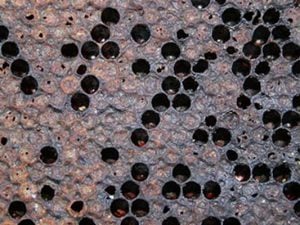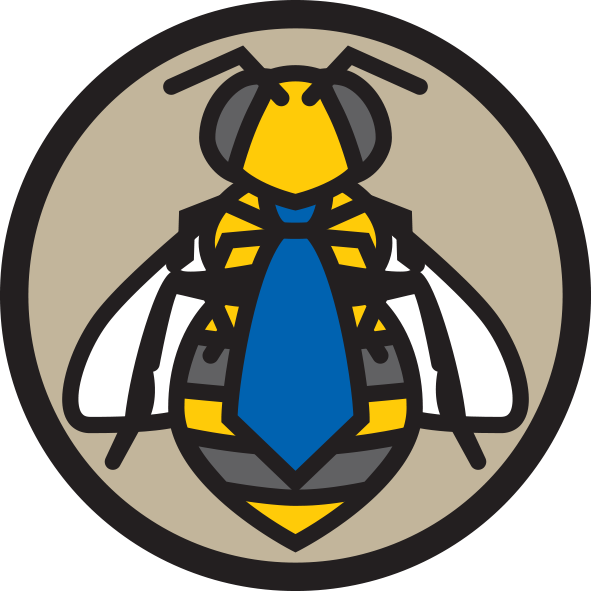American Foulbrood is a highly contagious and fatal disease caused by the bacterium Paenibacillus larvae. This bacterium can survive for extended periods by forming spores which are resistant to both environmental and chemical stressors. These spores can survive for decades (current estimates at more than 60-80 years) and still initiate an infection when fed to bee larvae. Because the spores are so resilient, there is no cure.
Video 1: Identifying American Foul Brood, D. Somerville, NSW Department of Primary Industries
The disease is spread by:
- Exchange of equipment between infected and healthy hives
- Bees robbing infected colonies
- Feeding contaminated honey and/or pollen
Detection
Inspect the brood comb for:

Characteristic dark, perforated cell cappings from an American foulbrood infested colony, D. Somerville, NSW DPI
- Brood pattern: late stage infections will be typified by a shotgun or pepperpot brood pattern (a mix of capped and uncapped cells).
- Infected larvae: uncapped late-stage larvae will be discoloured, from the usual pearly white to yellow or brown.
- Discoloured cell caps: cell caps over infected larvae will be darker and often have a wet appearance compared to surrounding cells.
- Shrunken cell caps
- Partly chewed or perforated caps: bees will inspect the diseased cells, and do so by chewing holes in the cell cappings.
- Brood cell scales: prolonged infection will see dead larvae drying out and forming hard, dark scales on the bottom of brood cells.
- Roping of infected brood: insertion and removal of a toothpick or stick into an infected cell will see a tan coloured rope of infected larval material extend out approximately 5cm from the cell. If you see this, you should make a smear of the affected larvae (see below) for submission to your state veterinary diagnostic laboratory.
- Smell: heavy infections will produce a foul smell, however light infections will not. This is not a reliable indicator of disease.
Diagnosis
You can send samples for testing if you’re not sure. Please follow the link for your state (QLD, NSW, VIC, TAS, SA, WA).
Prevention
- Employ a barrier management system to reduce risks of cross contamination
- Inspect the brood combs at least twice per year
- Minimise robbing from colonies during inspection and extraction
- Follow the Honey Bee Industry Biosecurity Code of Practice
- Gamma irradiation upon purchase of second-hand equipment, and of any equipment of unknown service history
- Biosecurity Online Training
Elimination
The bees must be killed by use of petrol or soapy water. Diseased hive components not to be reused can be incinerated. Equipment can be reused if you perform gamma irradiation or hot wax dipping. Note that any hive components hot wax dipped must be submerged within the wax for a minimum of 10min at 150-160°C. Also note that equipment contaminated with petrol or petrol fumes are not suitable for reuse and should be incinerated.
Legal obligations
It is ILLEGAL to use antibiotics in the management of American Foulbrood. American Foulbrood is a notifiable disease. You should report AFB in your own hives or those of another beekeeper on the hotline 1800 084 881 or through your state department (QLD, NSW, VIC, TAS, SA, WA).
Videos
Video 2: Making an American Foul Brood disease slide, D. Somerville, NSW Department of Primary Industries
Video 3: Management strategy for American Foul Brood, D. Somerville, NSW Department of Primary Industries
Acknowledgements
Somerville. Managing AFB. Guidelines for the identification and management of American foulbrood – a fatal disease of honey bee colonies. New South Wales Department of Primary Industries
About the authors Tom Gillard, Nadine Chapman

